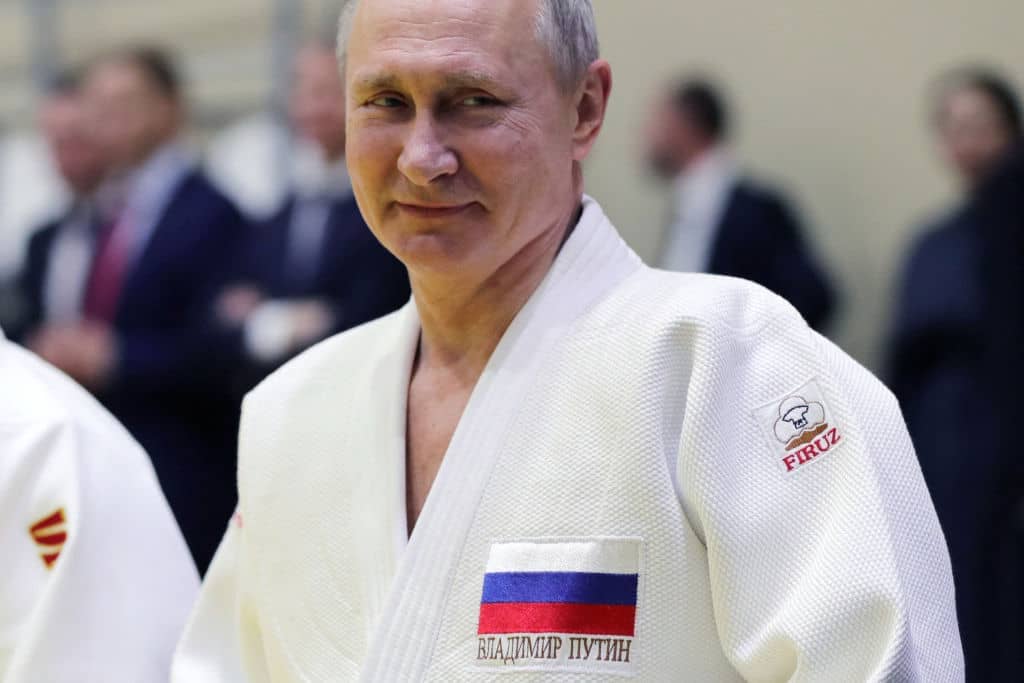Contemplating leaders and their heroes can be a revealing business. Churchill had busts of Nelson and Napoleon at Chartwell (and a portrait of John Churchill by his bedside). Ronald Reagan had a bronze head of an anonymous cowboy in the Oval Office; Boris Johnson has a bust of Pericles (who took advice only from his mistress Aspasia) on his desk at No. 10. Napoleon had a bust of Hannibal. But what of Vladimir Putin? According to the man himself he owns several portraits and a ‘very beautiful’ bust of a certain Kano Jigoro.
If you are neither Japanese nor a fan of martial arts that name may mean little. Kano Jigoro was the founder of Judo. But he didn’t just create a sport, he fashioned, according to Judo’s adherents, a philosophy of life. Putin, a black belt, has been obsessed with judo all his life (he began practicing at age 12) and some believe it may have informed not just his character but his political and even his military strategy.
As Putin told Japanese state broadcaster NHK in 2001:
The Japanese judo community have been searching for their souls in recent weeks
‘Judo changed my life. I trained physically in order to be a tough kid. I had tried boxing and wrestling but then I discovered judo. This was a turning point. Judo changed my way of thinking, my view of life, and my interactions with other people. `
Putin’s devotion to judo certainly served him well in the country of its origin. In 2000 and 2016 he paid visits to the prestigious headquarters of the sport the Kodokan. The nation purred as the Russian leader told the press he felt ‘a sense of peace like I am at home’. The nation swooned when he lauded the way judo was spreading the Japanese spirit and Japanese culture around the world. And the nation positively melted in admiration when Putin, offered a sixth dan belt (higher than black), said he was not worthy of the honour.
This may have been the beginning of the bizarre cult of ‘Poochin’ (an affectionate nickname) in Japan. Calendars of the Russian president in his trademark macho postures outsold all others, and he acquired a cult-like status, especially with the young. He was courted by prime minister Shinzo Abe – they held 26 personal meetings. Putin received a handsome Akita Inu dog called ‘Yume’ (dream) from Abe and gifted a Siberian cat to Akita’s governor in return.
But with the invasion of Ukraine the judo inspired infatuation looks to be over. New PM Fumio Kishida has unambiguously (rare for Japan) condemned the invasion and vowed to join sanctions and refugee efforts. As for the Kodokan, it has been inundated with calls for it follow the International Judo Federation and strip Putin of his titles, though this is unlikely to happen – even Shoko Asahara, who led the religious cult Aum Shinrikyo behind the 1995 Tokyo subway gas attack, was allowed to keep his judo rank).
But the ‘Poochin’ cult is over, Judoka are distancing themselves from the Russian leader, the calendars have disappeared. All that remains is an awkward question: was Putin inspired by Jigoro’s ideas in his invasion of Ukraine?
Links between the martial art and Putin’s political strategy are nothing new: Sergei Aleksashenko, Russia’s deputy finance minister from 1993 to 1995 and first deputy chairman of Russia’s Central Bank told Newsweek in 2014 that for Putin ‘the contemporary world is not a chessboard but a mat for judo grabs.’
One of the key maxims of Jigoro’s philosophy was ‘seiryoku zenyo’ – using whatever resources are to hand to maximum efficiency. The skilled Judoka should be able to beat a much heavier opponent, first by throwing them off balance, then by using their own weight against him. Many judo moves are based on the idea of a delicate looking cherry tree branch, bending under the weight of a heavy snowfall, then snapping back into position. Kimberly Martin, a Russia expert, and professor of political science at Columbia University observed that Putin ‘sizes up an opponent’s weakness, throws them off balance and then makes his opponent fall from his own weight.’
Nikolai Petrov a political analyst in Moscow sees this judo strategy in Putin’s apparent readiness to withstand sanctions, with the rationale being that his opponent will exhaust himself in the effort. Sanctions, like so much snow on the branches of the Sakura tree, can be borne and then cast off allowing Putin to ‘consolidate power, to build a fence, which is what he wants’ says Petrov.
The Japanese judo community have been searching for their souls in recent weeks. Yasuhiro Yamashita 1984 gold medalist has distanced himself from the Russian leader, and Kaori Yamaguchi, an Olympic medalist and seventh dan declared that ‘Putin is not a judoka’.
Kano Jigoro died in 1938. What would he have made of his acolyte’s interpretation of his life’s work? It seems likely he would have been appalled and pointed out Putin’s neglect of the second fundamental tenet of judo ‘Jita Kyoei’ or mutual benefit, the creation of a state of trust and prosperity in the larger world. As he said himself: ‘Once you take on power, you use it to do good’.







Comments